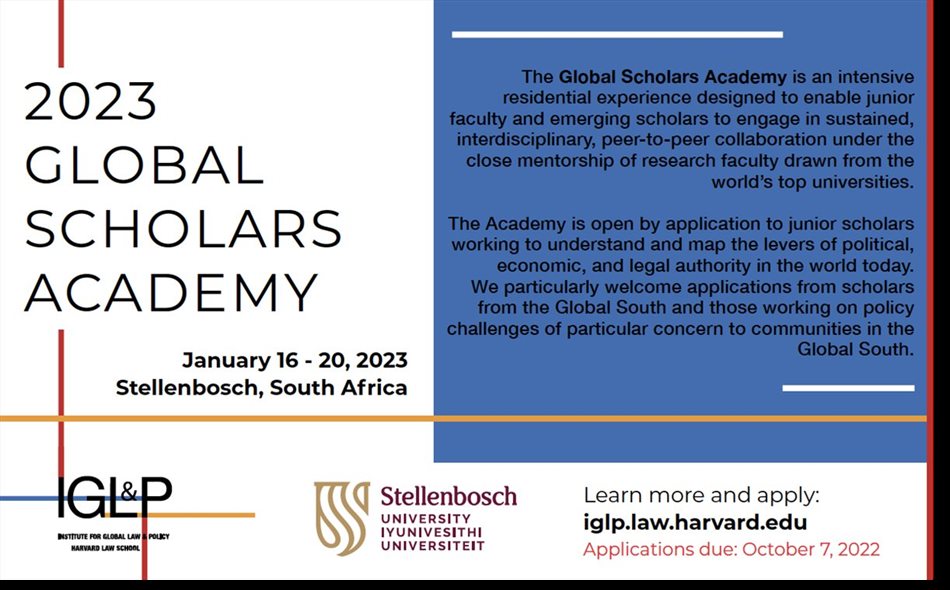- The 2023 Global Scholars Academy will be held 16-20 January 2023 in Stellenbosch, South Africa
- Apply at iglp.law.harvard.edu before 7 October 2022
- Stellenbosch University Faculty of Law (with the Faculty of Economics and Management Sciences) and the
Institute for Global Law and Policy (IGLP) at Harvard Law School offers up to 90 junior scholars from the GlobalSouth and the rest of the world the opportunity to enrol and participate in the Academy
The Global Scholars Academy is an intensive residential experience designed to enable junior faculty and postdoctoral scholars to engage in sustained, interdisciplinary, peer-to-peer collaboration under the close mentorship of research faculty drawn from the world’s top universities. The Academy is open by application to junior scholars working to understand and map the levers of political, economic, and legal authority in the world today. We particularly welcome applications from scholars from the Global South and those working on policy challenges of particular concern to communities in the Global South.

“The partnership in the Global Scholars Academy between Stellenbosch University Faculty of Law (with the Faculty of Economics and Management Sciences) and the Institute for Global Law and Policy (IGLP) at Harvard Law School serves as an endorsement of the academic and research excellence to be found at SU, offering up to 90 junior scholars from the Global South and the rest of the world the opportunity to enrol and participate in the Academy. The Global Scholars Academy is a prime example of how Stellenbosch University focuses on creating ground-breaking experiences in an immersive expanding learning culture,” says Prof. Nicola Smit, Dean of the Faculty of Law at Stellenbosch University.
The shared aim is to strengthen the next generation of scholars by placing them in conversation with their global peers and strengthening their ability to think in new ways about a global architecture manifestly ill-equipped to deal with the world’s most urgent challenges, from global poverty, inequality and injustice to conflict, migration, and environmental change. “The programs developed between our two institutions focus on the next generation of scholars from the global South working on these global challenges together with colleagues and mentors from around the world. We will launch our collaboration with a five-day Scholars Academy in South Africa in January 2023,” says Prof. Smit.
Building on the IGLP’s decade of successful workshops and Stellenbosch's dedication to high-level interdisciplinary research, the Global Scholars Academy will engage a growing community of scholars developing new thinking about the world’s most pressing policy challenges. While in residence, participants will workshop their ongoing research, review current scholarship developments, reconsider canonical texts, and network with colleagues from across the world.
The 2023 Academy will offer a unique interdisciplinary curriculum and will include thematic mini- courses, plenary lectures, and writing workshops. Writing workshops will offer participants the opportunity to receive detailed, valuable feedback on their research from their peers and senior colleagues in small group settings.
Preference will be given to scholars who hold postdoctoral junior faculty positions. Students completing their doctoral work are also encouraged to apply. All accepted participants will be expected to submit an 8000-word draft or work in progress of academic writing in advance of the Academy to be discussed with colleagues in our intensive Writing Workshops.
Drawing on the interdisciplinary resources and global networks of both institutions, this exciting new initiative will convene junior scholars for peer-to-peer mentoring with guidance from senior colleagues addressing issues of mutual concern. The research and network relationships gained will strengthen scholarship and university education across the world.
The collaboration will encourage scholarship exploring such pressing issues as the structural reproduction of poverty and inequality; the policy challenges and benefits of new technologies; links between local and global security; environmental sustainability and the impact of environmental change on communities across the global South, women’s empowerment, SDG’s; as well as the management of cultural difference, exclusion, and intolerance in a world of ever-increasing movement and communication.
